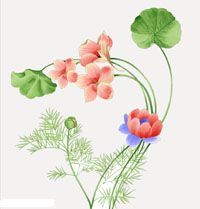Acupuncture and Herbs

If you would like to use Chinese herbs to enhance your ovarian and uterus function, you can follow the following steps:
Tonify kidney Yang:
Symptoms:
delayed period, scanty menses, light red color, post-menstrual low back pain and abdominal pain relived by warm pad, low sexual drive, dark circle around eyes, frequent night urination, loose stool, cold feet, low energy, aversion to cold, poor circulation on the lower part of the body. Allergies start in early childhood.
Treatment:
Eat warm food, avoid ice cold drink. Eat ginger root, lentils, grains like oats. Fruits should include dates and cherries
Commonly used herbs:
Hu Lu Ba, Shu Di, Fu Zi, Rou Gui, Ai Ye, Ba Ji Tian, Du Zhong, Bu Gu Zhi, Shu Di, Sang Ji Sheng, Tu Si Zi, Xu Duan, Xian Mao, Xian Ling Pi, Zi Shi Yeng, Jin Ying Zi. Some clinical report indicated that Fu Zi combined with Shu Di enhance the ovulation.
Kidney Yin deficiency:
Scanty or delayed period with bright red color, insomnia, dry eyes, mouth and skin, lower back pain with weak knees, night vision is declining, hot flashes, night sweats, Tongue: red and dry, no coating. Pulse: thin and fast. Lower back ache with warm sensation, feels hot in palms and bottom of the feet.
You can add Lycium seed and Dang Gui into your soup to tonify the kidney Yin and blood.
Commonly used herbs:
Niu Zhen Zi, Han Lian Cao, Sang Ji Sheng, shu Di, Gou Ji Zi, Shan Zhu Yu, Shan Yao, Lu Jiao Jiao, Di Gu Pi.
Spleen qi deficiency:
Symptoms:
copious period but thin and light color, dizziness, fatigue, spotting before or after the period, abdominal pain after the period, indigestion, bloating, gas, fatigue, tired after a big meal, weak muscles and tendons, pale complexion.
Treatment:
Consume mostly organic vegetables, lightly cooked, steamed or stirfried.
Do not eat raw and cold foods. Don't consume ice-cold beverages, ice cream and popsicles.
Cold foods should be eaten only in moderation. These include many fruits like mango, watermelon, pears, and persimmons.
Do not eat refined carbohydrates like white bread, or pasta.
Grains like rice, Job's tears barley (coix) and sorghum supplement the spleen.
Eat yams, pumpkin and pumpkin seeds.
Avoid sugar and sugar substitutes or any concentrated sweets including honey or maple syrup.
Have moderate damp creating foods like milk and milk products such as cheese or ice cream.
Commonly used herbs: Huang Qi, Dang Shen, Bai Zhu, Fu Ling, Tai Zi Shen, Zhi Gan Cao, Bai Zhu.
Blood stasis:
Symptoms:
scanty, black or very dark menses with clots and stabbing pain before or during the period. Many varicose veins in lower legs, fixed pain in certain body area, some dark spots on the tongue and enlarged sublingual vein.
Food and food supplement:
seaweed, safflower, fish oil, OPC/pycnogenol, fresh ginger and garlic are natural blood thinner, invigorating blood circulation.
Local application of warm pad during and after the period.
Commonly used herbs:
Tao Ren, Hong Hua, Wang Bu Ling Xing, Sang Leng, Er Zhu, Mei Gui Hua, Niu Xi, Ru Xiang, Mo Yao, Su Mu, Sheng Pu Huang, Wu Ling Zhi, Chuan Pe Shi, Cuan Shan Jia, Zao Jiao Ci, Liu Ji Nu, Yi Mu Cao, Chong Wei Zi.
Liver Qi stagnation:
Symptoms:
tend to sigh a lot, chest tightness, tender sensation on the hypochondriac area, mood swing, easily angered, bitter taste in the mouth, period is irregular with irregular temperature chart, cramping before or during the period, dark menses with breast tenderness.
Food to facilitate liver Qi movment: Peppermint, rosemary, spearmint, turmeric and thyme.
Deep breathing exercises and meditation
Massaging acupuncture points: liv3 and liv8.
To calm the sympathetic nervous system: calcium and magnesium.
Eat frequent, small meals to keep the blood sugar level more stable and inhibit the release of adrenaline.
Commonly used herbs:
Chai Hu, Xiang Fu, Zhi Qiao, Chi Shao, Chuan Xong, Qing Pi, Yan Hu Suo, Mei Gui Hua, Chuan Lian Zi, Bo He, Wu Yao, Guang Mu Xiang.
Phlegm condition:
Tend to develop cyst in the ovaries or other part of the body, clear throat frequently, have bronchitis several times during the winter, have sinusitis or asthma, may have lipoma in different parts of the body, foggy head, tend to sleep more but feel tired in the morning; feels better after exercises.
Food to reduce this condition: eat fresh ginger, avoid dairy product, greasy food, salty or sweet food.
Commonly used herbs: Dang Shen, Bai Zhu, Cang Zhu, Fu Ling, Chen Pi, Bai Zhi, Ban Xia, Dan Nan Xing, Zhe Bei Mu.
Damp heat:
Symptoms: tend to have a lot of thick yellowish vaginal discharges, swelling of lower legs, frequent dark urination, easily develop urinary tract infection, heavy sensation of lower legs; ovarian cysts.
Food: avoid spicy or greasy food.
Commonly used herbs: Niu Xi, Bai Zhi, Pu Gong Ying, Huang Bai, Huang Qin, Sheng Di Yu, Cang Zhu, Ma Bian Cao, Wan Can Sha, Chun Gen Bai Pi, Lu Xuan Cao, Bai Jiang Cao, Yu Xing Cao, and Cao He Che.
Blood deficiency:
Symptoms: pale facial color and nail color, fatigue, light pinkish period, may have constipation, pale or unhealthy finger or toe nails, pale tongue, weak pulse and menstrual cramp or headache after period.
Food: dates and resins.
Herbs: Dang Gui, Shu Di, Bai Shao, Gui Yuan, Da Zao, Ji Xue Teng, Suan Zao Ren, Er Jiao, Sang Ji Sheng, and He Shou Wu.
Most herbs used in treating women's problems are very safe and hardly have side effect if used properly. By balancing the hormones, you not only enhance your fertile ability, but you can postpone menopause and reduce or eliminate menopausal symptoms.
